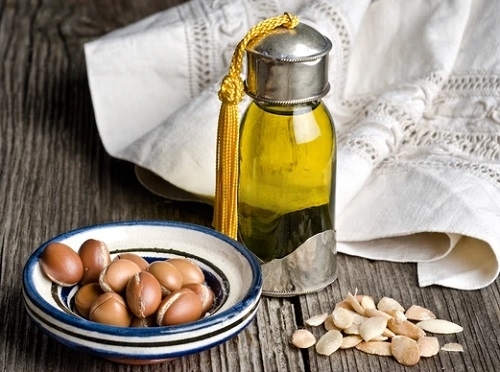Confused which one to pick—Argan oil vs Olive oil for Skin? Let’s weigh down the benefits of each below!
As more and more people are resorting to natural remedies, picking the right oil according to your skin type can be a challenge. To get a comprehensive view, head to this guide on argan oil vs olive oil for skin!
Argan Oil vs Olive Oil for Skin

1. Source and Composition
Argan Oil:
Argan oil comes from the kernels of the argan tree, which grows in Morocco. It’s packed with essential fatty acids like linoleic acid (omega-6) and oleic acid (omega-9), and it has high levels of vitamin E.
These nutrients make argan oil super nourishing and hydrating for your skin, which helps maintain a healthy skin barrier and keeps your skin from drying out.
Olive Oil:
Olive oil is made by pressing olives and is known for its high amount of monounsaturated fats, mainly oleic acid. It’s also loaded with antioxidants like vitamin E, polyphenols, and phytosterols.
These help protect your skin from damage caused by pollution and UV rays, making it a solid choice if you’re frequently exposed to environmental stressors.
2. Skin Benefits
Argan Oil:
- Argan oil is excellent for hydrating your skin, thanks to its high levels of vitamin E and fatty acids. If you have dry or sensitive skin, using argan oil can help lock in moisture and keep your skin smooth and supple.
- The antioxidants in argan oil, such as vitamin E and squalene, help fight free radicals, which can reduce the appearance of fine lines and wrinkles. Using argan oil can improve your skin’s elasticity and firmness, helping you maintain a youthful look.
- Argan oil has anti-inflammatory properties that can help calm irritated skin, reduce redness, and aid in healing skin conditions like eczema and acne. It’s a gentle way to soothe your skin and manage inflammation.
Olive Oil:
- Olive oil is rich in oleic acid, which helps lock moisture into your skin by creating a protective barrier. This makes it an excellent choice for treating dry, rough, or flaky skin. By sealing in moisture, olive oil helps keep your skin soft and smooth, and it supports the skin’s natural ability to repair and renew itself.
- Olive oil is rich in antioxidants like polyphenols and vitamin E, which help protect your skin from oxidative stress. This can help prevent premature aging and keep your skin looking youthful by reducing damage from free radicals.
- Olive oil contains oleocanthal, which has anti-inflammatory effects similar to those of ibuprofen. It can be used to soothe inflammation and irritation, making it helpful for conditions like eczema, psoriasis, or sunburn.
3. Texture and Absorption
Argan Oil:
Argan oil is lightweight and non-greasy, which means it absorbs quickly into your skin without leaving a heavy residue. This makes it a great choice for facial care, as it won’t clog your pores or make your skin feel oily.
Olive Oil:
Olive oil has a thicker texture and can feel heavier on your skin. It takes longer to absorb, which can leave a slight residue. This makes it better suited for dry or mature skin that needs more intense moisture.
4. Use Cases
Argan Oil:
You can use argan oil as a facial moisturizer, serum, or even for dry hair and nails. It’s versatile and works well in a daily skincare routine, either on its own or mixed with other products to boost hydration and provide antioxidant protection.
Olive Oil:
Olive oil is commonly found in body care products like lotions, soaps, and creams because it’s deeply nourishing. You can also use it for DIY skincare, like making exfoliating scrubs by mixing it with sugar or salt, or creating a hydrating body oil.
5. Suitability for Different Skin Types
Argan Oil:
Since it’s lightweight and non-comedogenic, argan oil is suitable for all skin types, including oily and acne-prone skin. It won’t clog your pores, making it a good choice if you’re looking to hydrate without causing breakouts.
Olive Oil:
Olive oil is best for dry, mature, or sensitive skin due to its rich, moisturizing properties. However, if you have oily or acne-prone skin, use it sparingly, as it can clog pores and potentially lead to breakouts.
Conclusion
Both argan oil and olive oil have great benefits for your skin, but the right choice depends on your specific skin needs. If you have oily or acne-prone skin and need something light that absorbs quickly, argan oil is a good option. It won’t leave your skin feeling greasy and is great for everyday use, providing hydration without clogging your pores.
On the other hand, if you have dry or mature skin that requires more intensive moisture, olive oil might be the better choice. Its rich texture deeply hydrates and nourishes the skin, making it perfect for treating dry patches and providing long-lasting softness.

